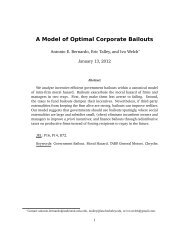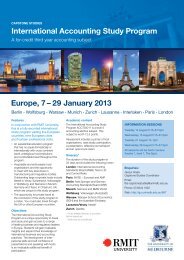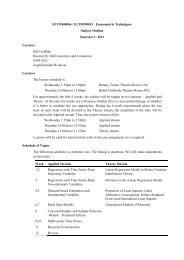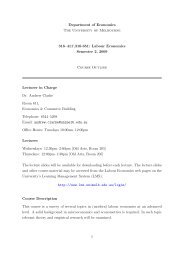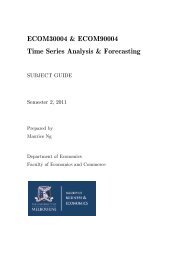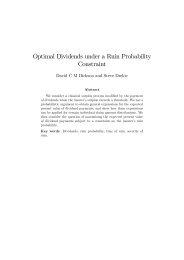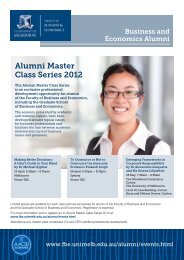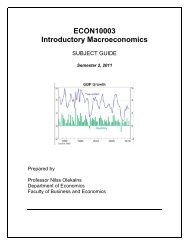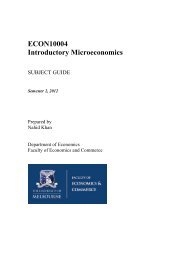Course Planning Guide 2012 - Faculty of Business and Economics
Course Planning Guide 2012 - Faculty of Business and Economics
Course Planning Guide 2012 - Faculty of Business and Economics
You also want an ePaper? Increase the reach of your titles
YUMPU automatically turns print PDFs into web optimized ePapers that Google loves.
<strong>Economics</strong><br />
<strong>Economics</strong> provides skills in problem solving <strong>and</strong> decision making for business <strong>and</strong> government. It teaches ways to<br />
underst<strong>and</strong> what happens in markets <strong>and</strong> how to underst<strong>and</strong> the performance <strong>of</strong> national economies, the global economy,<br />
approaches for analysing <strong>and</strong> interpreting data, <strong>and</strong> how to make decisions about key problems you will confront in a job<br />
in either the private, public or not for pr<strong>of</strong>it sectors.<br />
The skills that you learn in studying economics can lead to a career as a pr<strong>of</strong>essional economist; for example, working as a business<br />
consultant or economic analyst, or part <strong>of</strong> a team <strong>of</strong> economists working at a financial institution or government department or<br />
agency such as Treasury, Foreign Affairs <strong>and</strong> Trade, or the ACCC. <strong>Economics</strong> skills are also a very important part <strong>of</strong> the knowledge<br />
you will need to be successful in other careers such as an accountant or manager.<br />
At each year level, you can study subjects in economics <strong>and</strong> econometrics. Core subjects in macroeconomics, microeconomics<br />
<strong>and</strong> econometrics develop knowledge <strong>of</strong> general skills <strong>and</strong> concepts, while elective subjects present applications to a variety <strong>of</strong><br />
topics relevant to business <strong>and</strong> government. Teaching <strong>and</strong> development <strong>of</strong> knowledge in economics has a ‘building block’ format:<br />
to undertake level-2 subjects upwards in economics, you will need to have done one (or sometimes two) <strong>of</strong> the core subjects at the<br />
previous level.<br />
Major in <strong>Economics</strong><br />
To obtain a major in economics you will need to complete the following level-3 economics subjects:<br />
ÆÆ<br />
ECON30009 Macroeconomics<br />
ÆÆ<br />
ECON30010 Microeconomics<br />
ÆÆ<br />
ECOM30001 Basic Econometrics or ECOM30002 Econometrics<br />
Please check the prerequisites for these subjects at www.unimelb.edu.au/h<strong>and</strong>book<br />
Finance<br />
Finance is the study <strong>of</strong> how individuals, businesses <strong>and</strong> institutions raise funds, <strong>and</strong> how they allocate these funds to<br />
projects <strong>of</strong> differing risk <strong>and</strong> pay<strong>of</strong>f dates.<br />
The discipline <strong>of</strong> finance covers three key areas:<br />
ÆÆ<br />
Capital markets <strong>and</strong> financial institutions considers the operations <strong>and</strong> decisions <strong>of</strong> banks <strong>and</strong> other financial institutions,<br />
such as managed funds, <strong>and</strong> includes the optimal design <strong>of</strong> securities;<br />
ÆÆ<br />
Investments <strong>and</strong> financial planning investigates financial decision making by investors; i.e., the valuation <strong>and</strong> risk<br />
characteristics <strong>of</strong> securities; the optimal construction <strong>and</strong> management <strong>of</strong> investment portfolios; <strong>and</strong> the role <strong>of</strong> financial<br />
markets in trading these securities. This area also includes derivative securities.<br />
ÆÆ<br />
Corporate finance studies financial decision making by companies <strong>and</strong> investigates project evaluation, capital structure<br />
(the mix <strong>of</strong> debt <strong>and</strong> equity to fund investment projects), <strong>and</strong> dividend decisions (how much pr<strong>of</strong>it should be returned to<br />
shareholders).<br />
These core subject areas may be supplemented with more specialised subjects in financial planning (personal finance), real estate<br />
finance, banking, international finance, derivative securities, entrepreneurial finance, ethics in finance <strong>and</strong> Asian capital markets.<br />
Studying finance prepares students for a career in the finance sector <strong>and</strong> as finance specialists in industry <strong>and</strong> government. Possible<br />
careers include those <strong>of</strong> investment banker, securities broker, financial planner, financial analyst, commercial banker, finance<br />
manager, financial risk manager, financial regulator <strong>and</strong> financial marketer. Studies in finance complement the curriculum for students<br />
whose main study interests lie elsewhere, in areas such as accounting, econometrics, marketing <strong>and</strong> business law.<br />
Pr<strong>of</strong>essional Recognition<br />
The Finance <strong>and</strong> Treasury Association (www.finance-treasury.com) gives recognition to finance subjects in the BCom as part <strong>of</strong><br />
their membership <strong>and</strong> accreditation requirements. The Finance Department’s Introductory Personal Finance subject appears on<br />
the Australian Securities & Investments Commission (ASIC) Training Register (www.asic.gov.au). The University <strong>of</strong> Melbourne is a<br />
CFA Program Partner <strong>of</strong> the CFA Institute, the global association for investment pr<strong>of</strong>essionals that awards the prestigious CFA®<br />
designation (see www.cfainstitute.org). The partnership implies that the finance major in the BCom covers at least 70 percent <strong>of</strong> the<br />
Level I C<strong>and</strong>idate Body <strong>of</strong> Knowledge topics including the CFA Institute ethical <strong>and</strong> pr<strong>of</strong>essional st<strong>and</strong>ards.<br />
Major in Finance<br />
To obtain a major in finance you will need to complete the following level-3 finance subjects:<br />
ÆÆ<br />
FNCE30001 Investments<br />
ÆÆ<br />
FNCE30002 Corporate Finance<br />
ÆÆ<br />
FNCE30007 Derivative Securities<br />
Please check the prerequisites for these subjects at www.unimelb.edu.au/h<strong>and</strong>book<br />
13<br />
14



